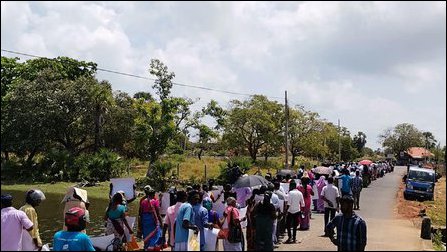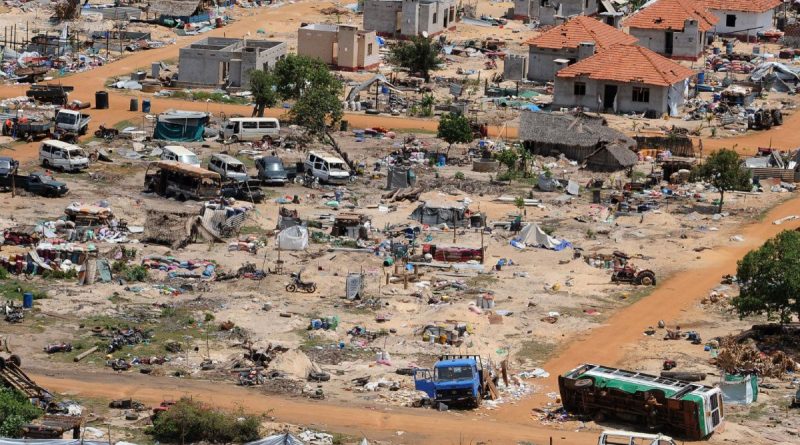Families of missing Urge UN to deliver international justice
Families of missing Urge UN to deliver international justice
The UN Human Rights Council based discourse has failed to deliver justice to the families of Eezham Tamils, who were subjected to enforced disappearance at the hands of the occupying Sinhala military, particularly during the 2009 genocidal onslaught. The victims have thoroughly rejected the Office of Missing Persons (OMP) as a farce. However, the Geneva-based UN rights institutions continue to uphold the deceptive OMP as a positive achievement, despite repeated appeals from the organisations representing the kith and kin of the persons subjected to enforced disappearances. The Geneva-based system was closing its eyes to the truth, and turning deaf ears to the three-year-long protests, the protesting mothers complained on International Women’s Day. Hundreds of people gathered to express solidarity with the protesting mothers at Mullaith-theevu on Sunday.
ஐ.நா. மனித உரிமைகள் கவுன்சில் காணாமல் ஆக்கப்பட்ட ஈழ தமிழர்களின் குடும்பங்களுக்கு நீதி வழங்கத் தவறிவிட்டது, அவர்கள் ஆக்கிரமித்துள்ள சிங்கள இராணுவத்தின் கைகளில் கட்டாயமாக காணாமல் போயுள்ளனர், குறிப்பாக 2009 இனப்படுகொலை தாக்குதலின் போது. பாதிக்கப்பட்டவர்கள் காணாமல்போனோர் அலுவலகத்தை (OMP) ஒரு கேலிக்கூத்தாக நிராகரித்தனர். எவ்வாறாயினும், ஜெனீவாவை தளமாகக் கொண்ட ஐ.நா. உரிமைகள் நிறுவனங்கள் ஏ.எம்.பி.யை ஒரு சாதகமான சாதனையாக தொடர்ந்து நிலைநிறுத்துகின்றன, பலமுறை காணாமல் போனவர்களுக்கு உட்படுத்தப்பட்ட நபர்களின் உறவினர்களையும் உறவினர்களையும் பிரதிநிதித்துவப்படுத்தும் அமைப்புகளின் முறையீடுகள் இருந்தபோதிலும். ஜெனீவாவை தளமாகக் கொண்ட அமைப்பு சத்தியத்திற்கு கண்களை மூடிக்கொண்டிருந்தது, மேலும் மூன்று ஆண்டுகால போராட்டங்களுக்கு செவிடன் காதுகளை திருப்பி, எதிர்ப்பு தெரிவித்த தாய்மார்கள் சர்வதேச மகளிர் தினத்தன்று புகார் கூறினர். ஞாயிற்றுக்கிழமை முல்லைத்-தீவுவில் ஆர்ப்பாட்டத்தில் ஈடுபட்ட தாய்மார்களுக்கு ஒற்றுமை தெரிவிக்க நூற்றுக்கணக்கான மக்கள் கூடியிருந்தனர்.

It was the failure of the UNHRC and associated mechanisms to bring international investigations on Tamil genocide that emboldened the SL State to dodge even what it agreed to do, the protesting mothers complained.
They were demanding the UN High Commissioner for Human Rights, her office and the UNHRC to urge the UN Security Council to refer the SL State to the ICC Prosecutor by passing a resolution authorised by the UN Charter.
If there are concerns over any Security Council permanent member vetoing the move, let it happen. Eezham Tamils and the global humanity need to know the powers that are opposed to them, the activists who took part in the protest told TamilNet.
The SL State signed the International Convention for the Protection of All Persons from Enforced Disappearances in December 2015.
However, the SL State has been openly violating the Article 2 of the Convention by refusing to accept the crime and concealing the fate or whereabouts of the disappeared Tamils at the hands of the SL military.
For the purposes of this Convention, “enforced disappearance” is considered to be the arrest, detention, abduction or any other form of deprivation of liberty by agents of the State or by persons or groups of persons acting with the authorization, support or acquiescence of the State, followed by a refusal to acknowledge the deprivation of liberty or by concealment of the fate or whereabouts of the disappeared person, which place such a person outside the protection of the law.
The organisations representing the mothers and wives of the missing as well as other survivors of the families have prepared an appeal to the UN High Commissioner for Human Rights Michelle Bachelet and the UNHRC.
The appeal states that there is no use in urging the SL State to abide by Resolution 30/1 anymore. So far, the UNHRC has been extending time and space to the SL State to dodge accountability. The UN Rights Chief must refer the case to the International Criminal Court through urging the UN Security Council to pass a resolution to that effect, the appeal stated.
Operationalisation institutions such as the OMP was to be carried out incorporating the consultations of the affected party. However, the recommendations of such processes were ignored by the SL State, the appeal explained.
Former SL President Maithiripala Sirisena promised to establish the whereabouts of the persons subjected to enforced disappearances. But, he ended up refusing state responsibility violating the commitments made by the SL State at the UNHRC.
தமிழ் இனப்படுகொலை தொடர்பாக சர்வதேச விசாரணைகளை கொண்டுவருவதில் யு.என்.எச்.ஆர்.சி மற்றும் அதனுடன் தொடர்புடைய வழிமுறைகள் தோல்வியுற்றது, இது செய்ய ஒப்புக் கொண்டதைக் கூட ஏமாற்றியது சிறீலங்கா.ஐ.நா. மனித உரிமைகள் உயர் ஸ்தானிகர்.
எந்தவொரு பாதுகாப்பு கவுன்சிலின் நிரந்தர உறுப்பினரும் இந்த நடவடிக்கையை வீட்டோ செய்வதில் கவலைகள் இருந்தால், அது நடக்கட்டும். ஈழ தமிழர்களும், உலக மனிதகுலமும் தங்களுக்கு எதிரான சக்திகளை அறிந்து கொள்ள வேண்டும் என்று போராட்டத்தில் பங்கேற்ற ஆர்வலர்கள் தமிழ்நெட்டிடம் தெரிவித்தனர்.
வலுக்கட்டாயமாக காணாமல் போனவர்களிடமிருந்து அனைத்து நபர்களையும் பாதுகாப்பதற்கான சர்வதேச மாநாட்டில் எஸ்.எல். அரசு 2015 டிசம்பரில் கையெழுத்திட்டது.
எவ்வாறாயினும், எஸ்.எல். அரசு மாநாட்டின் 2 வது பிரிவை பகிரங்கமாக மீறுகிறது, குற்றத்தை ஏற்க மறுத்து, விதியை மறைத்து அல்லது காணாமல் போன தமிழர்கள் எங்குள்ளது என்பதை சொல்லமறுத்து.
The continuous protests were launched on 08 March 2017 as a collective struggle, the appeal observed.
After Sirisena’s denial, the protesters lost hope in the so-called “good governance” regime and started to demand international investigations, notably since 16 November 2017, the appeal stated further.
The representatives of the continuous protest also went to Geneva and explained why they rejected the OMP. The organisations also gave five emblematic cases to test the OMP. But nothing happened.
In the meantime, seventy parents of the missing persons have perished during the last three years of the continuous protest, the organisers said.
தொடர்ச்சியான போராட்டங்கள் ஒரு கூட்டுப் போராட்டமாக 2017 மார்ச் 08 அன்று தொடங்கப்பட்டன,
சிறிசேனாவின் மறுப்புக்குப் பின்னர், எதிர்ப்பாளர்கள் “நல்லாட்சி” ஆட்சி என்று அழைக்கப்படுவதில் நம்பிக்கையை இழந்து சர்வதேச விசாரணைகளை கோரத் தொடங்கினர், குறிப்பாக நவம்பர் 16, 2017 முதல், மேல்முறையீடு மேலும் கூறியது.
தொடர்ச்சியான போராட்டத்தின் பிரதிநிதிகளும் ஜெனீவாவுக்குச் சென்று, அவர்கள் ஏன் OMP ஐ நிராகரித்தார்கள் என்பதை விளக்கினர். நிறுவனங்கள் OMP ஐ சோதிக்க ஐந்து அடையாள வழக்குகளையும் கொடுத்தன. ஆனால் எதுவும் நடக்கவில்லை.
இதற்கிடையில், தொடர்ச்சியான போராட்டத்தின் கடந்த மூன்று ஆண்டுகளில் காணாமல் போனவர்களின் எழுபது பெற்றோர்கள் உயிரிழந்துள்ளனர் என்று அமைப்பாளர்கள் தெரிவித்தனர்.
* * *
Walden Bello, a Filipino academic and rights activist recently interviewed Mary Aileen Diez-Bacalso, who served as the Secretary-General of the Asian Federation Against Involuntary Disappearances (AFAD) from its founding in June 1998 until July 2019. She was also the focal person of the International Coalition Against Enforced Disappearance (ICAED) from 2010 until July 2019.
Ms Diez-Bacalso, who actively participated in the drafting of the International Convention for the Protection of All Persons from Enforced Disappearance and who formed AFAD, was bestowed the prestigious Franco-German Ministerial Prize for Human Rights and the Rule of Law at the Embassy of France in Manila on 12 December 2019.
Diez-Bacalso became an activist after her husband was subjected to enforced disappearance in 1988. He was later released.
Her organisation, the AFAD, has reported the highest number of cases of enforced disappearances to the United Nations.
In the interview published by Rappler, a Philippine-based online news website, on 07 March, Bello posed a question to Diez-Bacalso on the cases of the disappeared in other countries. In her response, she referred the issue of the enforced disappearances of Tamils in the island as the worst case she had witnessed.
The question posed by Walden Bello and the response by Mary Aileen Diez-Bacalso follow:
Have you done work on the cases of the disappeared in other countries? How were those experiences similar or different to what you encountered in the Philippines?
Mary Aileen Diez-Bacalso: I’ve been engaged in work on the disappeared in Latin America, Africa, and even Europe, but most of my direct work has been in Asia, as secretary general of the Asian Federation against Involuntary Disappearances.
Probably the worst is Sri Lanka, where some 60,000 people were disappeared, most of them owing to the government’s draconian effort to subdue the Tamil Tigers.
In Kashmir, there are about 8,000 documented cases, many of which are of people reported to have been thrown into mass graves.
In Pakistan, there is a phenomenon of “surfaced disappeared.” The victims disappeared and after many years, returned alive – but heavily tortured and their minds permanently damaged.
In Bangladesh, we have people disappearing owing to the government’s “war on drugs,” following Duterte’s example.
SOURCE


